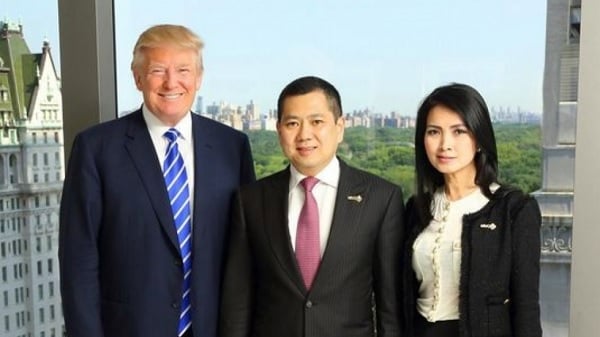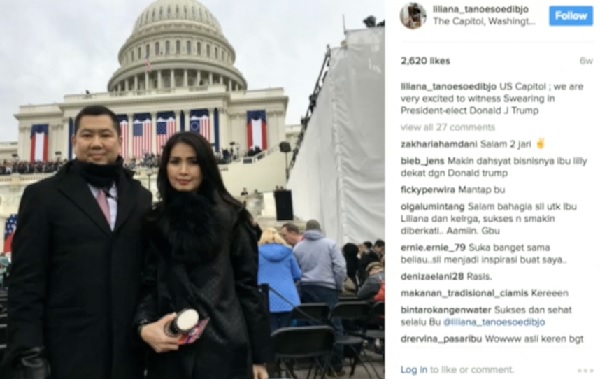
Donald Trump meets with Indonesian partners, 2015 (South China Morning Post).
President Donald J. Trump’s overseas business dealings have once again come under scrutiny with reports that the Chinese government will provide financing to the tune of $500 million for construction of a theme park in Indonesia featuring a Trump-branded golf course and resort-hotel. This news comes on the heels of Trump’s surprise announcement that he will offer concessions to Chinese telecommunications company ZTE, recently hit with a U.S. components ban after violating sanctions against Iran and North Korea.
Trump’s concessions to ZTE prompted “bipartisan rebuke,” accusations of “putting China first and letting sanction-breakers off the hook,” and suspicions that the concessions might be linked to China’s financing of the Trump-branded Indonesian deal worth millions of dollars to Trump. The White House refused to answer questions from media on whether the deal might violate the U.S. Constitution’s foreign emoluments clause and Trump’s own pledge not to pursue new foreign business deals while serving as president.
As Agence France-Presse via the South China Morning Post and the National Review report, the billion-dollar theme park project featuring the Trump brand is part of MNC Lido City, an “integrated lifestyle resort” outside the Indonesian capital city of Jakarta. The project developer, MNC Land, features its “partnership with The Trump Hotel Collection” on its company website (archive), boasting that the “Trump International Resort” in Lido City is “the first Trump Collection Resort in Asia bearing the prestigious Trump brand name, known for unparalleled luxury and quality” (archive).
MNC Land CEO Hary Tanoesoedibjo (aka Hary Tanoe) and his wife Liliana, pictured above, visited Trump in New York in 2015 to finalize the deal for Trump resorts in Lido City and Bali. Tanoesoedibjo has boasted about his access to Trump and attended Trump’s presidential inauguration in January 2017. While in Washington for the inauguration, Tanoesoedibjo and his family stayed at the Trump International Hotel, a noted magnet for foreign emoluments concerns. Tanoesoedibjo has also suggested a possible run for president of Indonesia in 2019.

Hary and Liliana Tanoesoedibjo attend Trump inauguration (DetikNews).
Never far from their father’s conflicts of interest and foreign emoluments concerns, Donald Trump’s daughter and “senior adviser” Ivanka, and sons Eric and Donald Jr., also appear to be involved in the Indonesia project. “Each of them has different roles” says Tanoesoedibjo, “Don Jr. has responsibility for the overall project, Eric the design and golf, and Ivanka more of detail – the fit-out of the hotel.” Tanoesoedibjo posted photographs of a meeting with the Trump sons in New York on Twitter two days before their father’s inauguration.
In April 2017, The Intercept reported Tanoesoedibjo’s alleged involvement with an ISIS-backed militia in an effort to oust current Indonesian President Joko Widodo. Linked to this effort also was Indonesian politician Fadli Zon, “Trump’s main political booster in the country,” who made an unexpected appearance at a U.S. Trump campaign event in 2015. Then-speaker of the Indonesian parliament Setya Novanto, who appeared with Fadli Zon at the event and is also noted as “a Trump admirer,” has since been imprisoned for graft. The two politicians’ appearance at the event was reportedly arranged by Tanoesoedibjo and linked to Trump’s business interests in Indonesia.
China’s financing for half the cost of the project comes from Central Research Institute of Building and Construction Co., Ltd. (中冶建筑研究总院有限公司), a subsidiary of state-owned China Metallurgical Group Corporation (中国冶金科工集团有限公司 or 中国中冶集团), also known as Metallurgical Corporation of China (中国冶金科工股份有限公司, MCC) and managed by senior members of the Chinese Communist Party. According to the National Review, China’s involvement in the deal is “part of Beijing’s global influence-expanding ‘Belt and Road’ infrastructure initiative,” seen by many observers as part of a broader effort by China to “supplant the United States” as a leader in world affairs.
It is not certain that Trump’s “odd” and “stunning reversal” on ZTE was prompted by China’s agreement to provide financing for the Trump-Indonesia project. Trump is certain to profit from from the deal, however, and announced his concessions to ZTE a mere 72 hours after China agreed to finance the project. Former White House ethics counsels from both the George W. Bush and Barack Obama administrations commented that the move by Trump was suspicious at the very least and constituted a possible violation of the foreign emoluments clause.
In addition to its sanctions violations, ZTE is seen as a potential national security threat to the United States given its close ties to the Chinese government and the possibility that its smartphones and other devices might be used for surveillance or espionage. In 2016, Chinese-authored spyware was found on Chinese-made smartphones including phones manufactured by ZTE.
This is not the first time that the Trump family’s business dealings with China and Indonesia have come under scrutiny. Donald and Ivanka Trump have both been awarded valuable trademarks for their businesses by the Chinese government since the Trump inauguration, prompting constitutional concerns regarding foreign emoluments. Many of the products sold by Ivanka Trump’s fashion company are produced at factories in China and in Indonesia where horrifying sweatshop conditions have been reported.
The family of Trump son-in-law and “senior adviser” Jared Kushner has also come under fire for touting its presidential connections to lure Chinese investors for its New York-area real estate projects through the controversial EB-5 “visa-for-sale” scheme for wealthy foreign investors. China’s “courtship” of Jared Kusher and Ivanka Trump as conduits of influence on the Trump administration has been noted with alarm.
Concerns that the President of the United States and his “senior advisers” might be making foreign policy decisions on the basis of their business interests rather than U.S. national interests have become an everyday fact of life for Americans in the Trump era. Trump’s Indonesian resort deal, and the latest news of China’s financing for the deal, have only made the mountain of Trump-Kushner conflict-of-interest concerns a little bit higher.